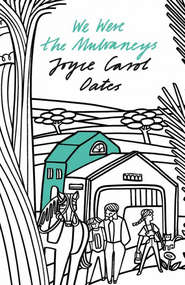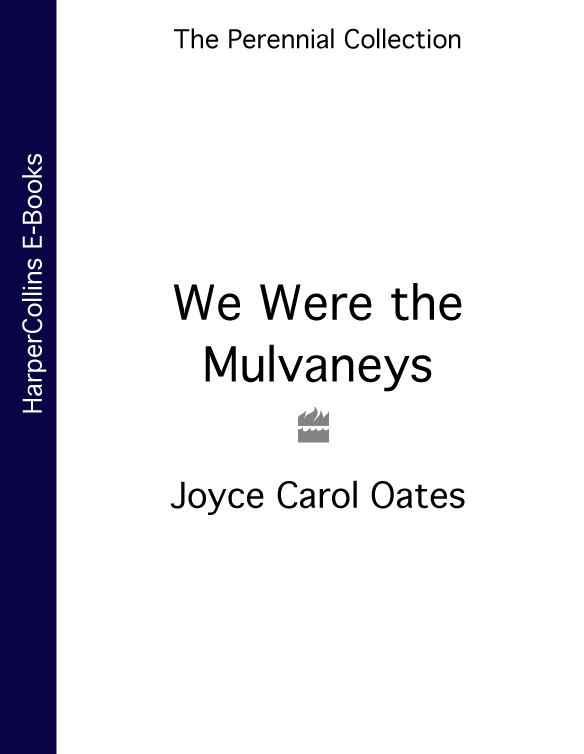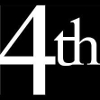
Полная версия:
We Were the Mulvaneys


JOYCE CAROL OATES
We Were the Mulvaneys
A NOVEL


This novel is entirely a work of fiction. The names, characters and incidents portrayed in it are the work of the author’s imagination. Any resemblance to actual persons, living or dead, events or localities is entirely coincidental.
Fourth Estate
An imprint of HarperCollinsPublishers Ltd. 1 London Bridge Street London SE1 9GF
www.harpercollins.co.uk
This edition published by Harper Perennial 2008
First published in Great Britain by Fourth Estate in 2001
Copyright © The Ontario Review, Inc. 1996
The quoted passage on page 177 is taken from Ludwig von Bertalanffy,
Problems of Life: An Evaluation of Modern Biological and Scientific Thought (Pitman Publishing, Ltd, London, 1952), page 103
PS Section copyright © Sarah O’Reilly 2008, except ‘What is a Family except Memories?’ by Joyce Carol Oates © The Ontario Review, Inc. 2008 PS™ is a trademark of HarperCollinsPublishers Ltd.
Joyce Carol Oates asserts the moral right to be identified as the author of this work
A catalogue record for this book is available from the British Library
All rights reserved under International and Pan-American Copyright Conventions. By payment of the required fees, you have been granted the nonexclusive, nontransferable right to access and read the text of this ebook on-screen. No part of this text may be reproduced, transmitted, downloaded, decompiled, reverse engineered, or stored in or introduced into any information storage and retrieval system, in any form or by any means, whether electronic or mechanical, now known or hereinafter invented, without the express written permission of HarperCollins ebooks
HarperCollinsPublishers has made every reasonable effort to ensure that any picture content and written content in this ebook has been included or removed in accordance with the contractual and technological constraints in operation at the time of publication
Source ISBN: 9780007268399
Ebook Edition © DECEMBER 2012 ISBN: 9780007502134
Version: 2017-04-20
PRAISE
From the reviews of We Were the Mulvaneys:
‘Oates’s finest … a major achievement’
Chicago Tribune
‘We Were the Mulvaneys works not simply because of its meticulous details and gestures … What keeps us coming back to Oates Country is something stronger and spookier: her uncanny gift of making the page a window, with something on the other side that we’d swear was life itself’
DAVID GATES, New York Times
‘This is a book that will break your heart, heal it, then break it again every time you think about it’
Los Angeles Times
‘Novelists such as Updike, Roth, Wolfe and Mailer slug it out for the title of the Great American Novelist. But maybe they’re wrong. Maybe, just maybe, the Great American Novelist is a woman’
Herald
‘A brilliantly detailed and varied picture of family life and a succession of dramatic set pieces … These are people we recognise, and she makes us care deeply about them’
Kirkus
DEDICATION
for my “Mulvaneys” …
EPIGRAPH
I bequeath myself to the dirt to grow from the grass I love,If you want me again look for me under your boot-soles.
You will hardly know who I am or what I mean,But I shall be good health to you nevertheless,And filter and fibre your blood.
Failing to fetch me at first keep encouraged.Missing me one place search another,I stop some where waiting for you.
from Walt Whitman, Song of Myself
CONTENTS
Cover
Title Page
Copyright
Praise
Dedication
Epigraph
I. FAMILY PICTURES
Storybook House
The Doe
St. Valentine’s 1976
Ringing the Cowbell
Family Code
Dirty Girl
Providence
Strawberries & Cream
Secrets
The Revelation
Babies
Damaged Girl
The Lovers
Imminent Mortality
Every Heartbeat!
The Assault
The Penitent
Ask Dad
Boys Will Be Boys!
Phase
Gone
II. “THE HUNTSMAN”
One By One
Valedictory Speech
Snow After Easter
“The Huntsman”
Plastica
Dignity
Reverse Prayer
The Accomplice
Brothers
Crossing Over
The Handshake
The Bog
III. “THE PILGRIM”
Tears
Green Isle
The Pilgrim
The Proposal
Rag-Quilt Life
IV. HARD RECKONING
Hard Reckoning
On My Own
The White Horse
Stump Creek Hill
Intensive Care
Gone
EPILOGUE REUNION: FOURTH OF JULY 1993
KEEP READING
P.S. IDEAS, INTERVIEWS & FEATURES …
About the Author
The Continuity of Generations
Life at a Glance
About the Book
What is a Family Except Memories?
Read On
Have You Read?
If You Liked this, Why not Try More From the Perennial Collection
About the Author
Also by the Author
About the Publisher
STORYBOOK HOUSE
We were the Mulvaneys, remember us?
You may have thought our family was larger, often I’d meet people who believed we Mulvaneys were a virtual clan, but in fact there were only six of us: my dad who was Michael John Mulvaney, Sr., my mom Corinne, my brothers Mike Jr. and Patrick and my sister Marianne, and me—Judd.
From summer 1955 to spring 1980 when my dad and mom were forced to sell the property there were Mulvaneys at High Point Farm, on the High Point Road seven miles north and east of the small city of Mt. Ephraim in upstate New York, in the Chautauqua Valley approximately seventy miles south of Lake Ontario.
High Point Farm was a well-known property in the Valley, in time to be designated a historical landmark, and “Mulvaney” was a well-known name.
For a long time you envied us, then you pitied us.
For a long time you admired us, then you thought Good!—that’s what they deserve.
“Too direct, Judd!”—my mother would say, wringing her hands in discomfort. But I believe in uttering the truth, even if it hurts. Particularly if it hurts.
For all of my childhood as a Mulvaney I was the baby of the family. To be the baby of such a family is to know you’re the last little caboose of a long roaring train. They loved me so, when they paid any attention to me at all, I was like a creature dazed and blinded by intense, searing light that might suddenly switch off and leave me in darkness. I couldn’t seem to figure out who I was, if I had an actual name or many names, all of them affectionate and many of them teasing, like “Dimple,” “Pretty Boy” or, alternately, “Sourpuss,” or “Ranger”—my favorite. I was “Baby” or “Babyface” much of the time while growing up. “Judd” was a name associated with a certain measure of sternness, sobriety, though in fact we Mulvaney children were rarely scolded and even more rarely punished; “Judson Andrew” which is my baptismal name was a name of such dignity and aspiration I never came to feel it could be mine, only something borrowed like a Hallowe’en mask.
You’d get the impression, at least I did, that “Judd” who was “Baby” almost didn’t make it. Getting born, I mean. The train had pulled out, the caboose was being rushed to the track. Not that Corinne Mulvaney was so very old when I was born—she was only thirty-three. Which certainly isn’t “old” by today’s standards. I was born in 1963, that year Dad used to say, with a grim shake of his head, a sick-at-heart look in his eyes, “tore history in two” for Americans. What worried me was I’d come along so belatedly, everyone else was here except me! A complete Mulvaney family without Judd.
Always it seemed, hard as I tried I could never hope to catch up with all their good times, secrets, jokes—their memories. What is a family, after all, except memories?—haphazard and precious as the contents of a catchall drawer in the kitchen (called the “junk drawer” in our household, for good reason). My handicap, I gradually realized, was that by the time I got around to being born, my brother Mike was already ten years old and for children that’s equivalent to another generation. Where’s Baby?—who’s got Baby? the cry would commence, and whoever was nearest would scoop me up and off we’d go. A scramble of dogs barking, their eagerness to be taken along to wherever a mimicry of my own, exaggerated as animals are often exaggerations of human beings, emotions so rawly exposed. Who’s got Baby? Don’t forget Baby!
The dogs, cats, horses, even the cars and pickups Dad and Mom drove before I was born, those big flashy-sexy Fifties models—all these I would pore over in Mom’s overstuffed snapshot albums, determined to attach myself to their memories. Sure, I remember! Sure, I was there! Mike’s first pony Crackerjack who was a sorrel with sandcolored markings. Our setter Foxy as a puppy. The time Dad ran the tractor into a ditch. The time Mom threw corncobs to scare away strange dogs she believed were threatening the chickens and the dogs turned out to be a black bear and two cubs. The time Dad invited 150 people to Mulvaney’s Fourth of July cookout assuming that only about half would show up, and everyone showed up—and a few more. The time a somewhat disreputable friend of Dad’s flew over to High Point Farm from an airport in Marsena in a canary-yellow Piper Cub and landed—“Crash-landed, almost,” Mom would say dryly—in one of the pastures, and though the baby in the snapshots commemorating this occasion would have to have been my sister Marianne, in July 1960, I was able to convince myself Yes I was there, I remember. I do!
And when in subsequent years they would speak of the incident, recalling the way the wind buffeted the little plane when Wally Parks, my Dad’s friend, took Dad up for a brief flight, I was positive I’d been there, I could recall how excited I was, how excited we all were, Mike, Patrick, Marianne and me, and of course Mom, watching as the Piper Cub rose higher and higher shuddering in the wind, grew smaller and smaller with distance until it was no larger than a sparrow hawk, high above the Valley, looking as if a single strong gust of wind could bring it down. And Mom prayed aloud, “God, bring those lunatics back alive and I’ll never complain about anything again, I promise! Amen.”
I’d swear even now, I’d been there.
For the Mulvaneys were a family in which everything that happened to them was precious and everything that was precious was stored in memory and everyone had a history.
Which is why many of you envied us, I think. Before the events of 1976 when everything came apart for us and was never again put together in quite the same way.
We Mulvaneys would have died for one another, but we had secrets from one another just the same. We still do.
I’m an adult telling you these things: Judd Mulvaney, thirty years old. Editor in chief of the Chautauqua Falls Journal, a twice-weekly publication, circulation 25,600. I’ve been a newspaperman or in any case working for newspapers since the age of sixteen and though I love my work and am, I suppose, fairly obsessed by it, I’m not ambitious in any worldly sense. I’ve been entrusted by the elderly gentleman publisher of the Journal, who happens to be a friend of mine, to put out a “good, decent, truth-telling paper” and that’s what I’ve been doing and will continue to do. Moving out and up to better-paying jobs in larger cities evokes only the mildest glimmer of interest in me. I’m not a newspaperman who strives for sensation, controversy. I’d rather be truth-telling and I hope always to be without hypocrisy.
I’ve constructed a personality that is even and temperate and on the whole wonderfully civilized. People murmur to Corinne Mulvaney, after they’ve met me, “What a nice young man!” and, if they’re women like her, women of her age with grown and far-flung children, “Aren’t you lucky, to have such a son!” In fact I suppose Mom is lucky, not just because she “has” me but because she “has” my brothers and sister too, and we love her as much or nearly as much as she loves us.
Mom doesn’t know and I hope never will know that two of her sons were involved in a criminal action of extreme seriousness. I’ll be direct with you: I’ve been an accomplice to two Class-A felonies punishable by lengthy prison terms in New York State and I came close to being an accessory both before and after the fact in an actual case of murder and very possibly I would not be repentant if this murder had been committed. Certainly my brother Patrick, who came close to committing the murder, would not have been repentant. Asked by the judge to speak on his own behalf, at the time of sentencing, Patrick would have looked the man in the eye and said, “Your Honor, I did what I did and I don’t regret it.”
Many times in my imagination I’ve heard Patrick say these words. So many times, I almost think, in that twilight state of consciousness between sleep and wakefulness, which involves a subtle, shifting, mysterious personality few of us have explored, that in fact Patrick was arrested, tried, and convicted for murder, kidnapping, auto theft—whatever the numerous charges would have been—and had stood before a judge and spoke in just this way. Then I force myself awake, and relief floods through me like sunshine! It didn’t happen, not in that way.
But this document isn’t a confession. Not at all. I’ve come to think of it as a family album. The kind my mom never kept, absolute truth-telling. The kind no one’s mom keeps. But if you’ve been a child in any family you’ve been keeping such an album in memory and conjecture and yearning, and it’s a life’s work, it may be the great and only work of your life.
I’ve said there were six in our family but that’s misleading. Six is such a small number! In fact High Point Farm was busy and complicated and to a child confusing as a stage play in which familiar and unfamiliar faces are ceaselessly coming and going. Friends, relatives, houseguests, Dad’s business contacts, hired help—every day and frequently every hour you could count on it that something was happening. Both my parents were sociable, popular people who had little patience with quiet, let alone solitude. And we lived on a farm. We owned horses, dairy cows, goats, a few sheep, chickens and guinea fowl and geese and semi-tame mallard ducks. What a barnyard squawking in the early morning, when the roosters crowed! I grew up with such sounds, and the cries of wild birds (mainly jays who nested close about the house in our giant oaks), I came to believe they were part of the very fabric of morning itself. The very fabric of my soul.
Unlike neighboring farms in the Valley, High Point Farm wasn’t any longer a “real” farm. Dad’s income came from Mulvaney Roofing, in Mt. Ephraim. Originally, the farm property had included three hundred acres of good, fertile if hilly soil, but by the time Dad and Mom bought it, only twenty-three acres remained; and of these, Dad leased fifteen to neighboring farmers to grow timothy, wheat, soybeans, alfalfa, corn. But we had farm animals we loved, and of course we had dogs, rarely less than four, and cats—cats!—always a select number of cats allowed inside the house and an ever-shifting number of barn cats. My earliest memories were of animals with personalities stronger than my own. A horse has a very defined yet often unpredictable personality unlike, for instance, a dog; a cat can be virtually anything. Dad used to complain jokingly that the boss of the household was a certain temperamental, supremely self-absorbed and very beautiful Persian cat named Snowball and the second-in-command was Mom, of course, and after that he didn’t care to speculate, it was too humbling.
“Oh, yes! We all feel sorry for poor Curly, don’t we?”—Mom teased affectionately, as Dad made a brooding face. “So neglected in his own home!”
Say I counted the animals and fowl of High Point Farm with personalities defined enough to have been named—how many might there have been? Twenty? Twenty-five? Thirty? More? And of course they were always shifting, changing. A new litter of puppies, a new litter of kittens. Spring lambs, goats. It was rare that a foal was born but when a foal was born, after many days and nights of worry (mainly on Mom’s part, she’d sometimes sleep in the stable with the pregnant mare) it was quite an occasion. Several families of canaries had come and gone before I was born and it was a fond household tale of the time Mom had tried to breed canaries right there in the kitchen, the problem being she’d succeeded only too well, and at the height of the “canary epidemic” as Dad called it there were three large cages containing a total of fifteen canaries, trilling, warbling, chirping, scolding, sometimes screeching—“And ceaselessly defecating,” as Dad said dryly. I remember once when I was very small, Dad brought home a spindly-legged little gray goat because its owner, a neighboring farmer, had been going to shoot it—“Come meet Billy-boy!” Dad announced. Another time, Mom and Mike returned from a trip to the feed store in Eagleton Corners with a large flamey-feathered golden-eyed strutting bantam cock—“Everybody come meet Cap’n Marvel!” Mom announced. My first puppy was a bulldog named Little Boots with whom I would grow up like a brother.
When I think of us then, when we were the Mulvaneys of High Point Farm, I think of the sprawling, overgrown and somewhat jungly farm itself, blurred at the edges as in a dream where our evercollapsing barbed wire fences trailed off into scrubby, hilly, uncultivated land. (On a farm, you have to repair fences continually, or should.) Getting us into focus requires effort, like getting a dream into focus and keeping it there.
One of those haunting tantalizing dreams that seem so vivid, so real, until you look closely, try to see—and they begin to fade, like smoke.
Let’s drive out to High Point Farm!
Come with me, I’ll take you there. From Route 58, the Yewville Pike, a good two- and three-lane country highway linking Rochester, Yewville and Mt. Ephraim on a straight north-south axis, you pass through the crossroads town of Lebanon, continue for eight miles following the Yewville River and crossing the erector-set new bridge at Mt. Ephraim. (Population 19,500 in 1976.) Continue along what turns into Meridian Street, passing the aged redbrick mill factories on the river (manufacturers of ladies’ handbags, sweaters, footwear) that have the melancholy look of shutdown businesses but are in fact operating, to a degree. Take a right onto Seneca Street past the stately-ugly old Greek Revival building that is the Mt. Ephraim Public Library with the wrought-iron fence in front. Past the Mt. Ephraim Police Headquarters. The Veterans of Foreign Wars. The Odd Fellows. Bear right at the square, where most of the tall old elms have been removed, and continue on to Fifth Street, where you take a right at Trinity Episcopal Church.
No—wait. This route is a shortcut to avoid Mt. Ephraim’s “downtown” (hardly more than three blocks but the old, narrow streets can get congested). Let’s circle around to the far end of South Main Street, another right, and a left, now we’re in an area of small businesses and warehouses. There’s Mulvaney Roofing—a smallish single-storey stucco building, recently painted an attractive dark green with white trim. On the roof are state-of-the-art asphalt-and-polyester shingles in a slightly darker shade of green.
How proud Dad was of Mulvaney Roofing. How hard he’d worked for it, and to build up his reputation as a man you not only wanted to do business with because his product was so fine but because you liked and respected him as a damned nice guy.
Now back onto Fifth, and continue for three blocks. Passing on the left Mt. Ephraim High where we Mulvaney children all went to school, in turn (factory-style design, flat leaky roof and cheap bargain bricks built in the mid-Sixties and already showing signs of wear) and the school playing fields and at the corner a town ballpark, nothing spectacular, a few bleachers and a weedy infield and litter drifting in the wind like tumbleweed. There’s Rose & Chubby’s Diner, there’s the Four Corners Tavern with the cinder parking lot. Past Depot Street. Past Railroad. Down the long hill past Drummond’s Gloves, Inc.—still operating in 1976, skidding just ahead of bankruptcy. (Mr. Drummond was an acquaintance of my dad’s, we’d hear of the poor man’s problems at mealtimes.) Bear right at the fork in the road past Apostles of Christ Tabernacle, one of Mom’s first churches in the area but back before Judd was born, a sad cinder-block building with a movie house marquee and bright pink letters REJOICE ALL, CHRIST IS RISEN! Continue across the train tracks and past the Chautauqua & Buffalo freight yards. You’ll see the water tower fifty feet above the ground on what I’d always think were “spider legs”: MT. EPHRAIM in rainwashed white letters. (Probably there are Day-Glo scrawls, initials and graffiti on the water tower, too. Probably CLASS OF ’76 MT.E.H.S. There’s an ongoing struggle between local officials who want the tower clear of graffiti and local high school kids determined to mark it as their own.)
Turn now onto Route 119, the Haggartsville Road, a fast-moving state highway. Gulf station on the left, Eastgate Shopping Center on the right, the usual fast-food drive-through restaurants like Wendy’s, McDonald’s, Kentucky Fried Chicken all recently built along this strip in the early 1970’s. Spohr’s Lumber, Hendrick Motors, Inc. Familiar names because the owners were friends of my dad’s, fellow members of the Mt. Ephraim Chamber of Commerce, the Odd Fellows, the Mt. Ephraim Country Club. The traffic light ahead marks the town limits. Beyond, on the left, is Country Club Lane that leads back from the busy highway for miles in an upscale “exclusive” residential neighborhood; the Mt. Ephraim Country Club itself isn’t visible from the highway but you can see the rolling green golf course, a finger of artificial lake glittering like broken glass. On the right is a similiar prestige housing development, Hillside Estates. Now you’re out of town and the speed limit is fifty-five miles an hour but everyone is going faster. Heavy trucks, semis. Local pickups. You’re passing small farms, open fields as the highway gradually ascends. Railroad tracks run close beside the road for several miles then veer off through a tunnel that looks as if it’s been drilled through solid rock. Beyond a scattering of shantylike houses and a sad-looking trailer village there’s a narrow blacktop road forking off to the right: High Point Road.



